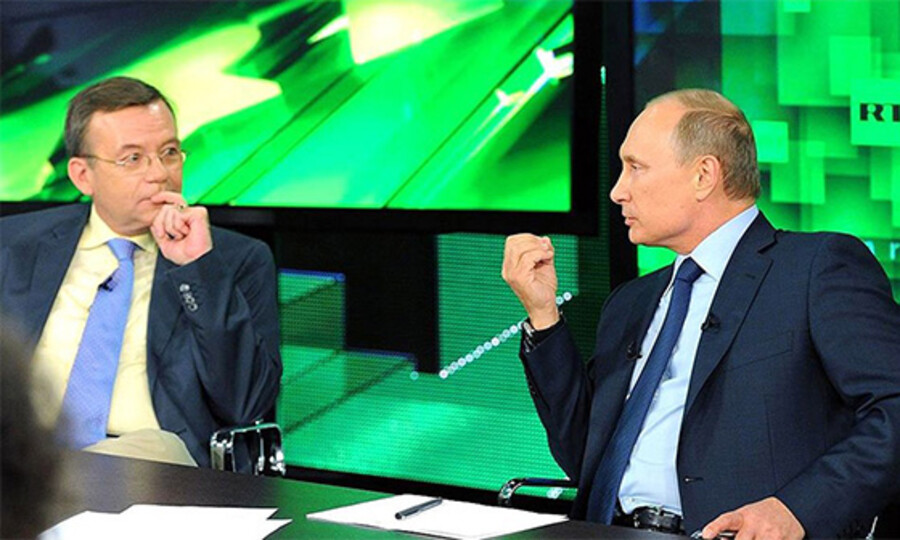
Kremlin.ru/Creative Commons
Government Control of Russian Media at Highest Level ‘Since the Fall of the Soviet Union’
“State intrusion in media affairs has reached a level not seen in Russia since the fall of the Soviet Union,” reads a sentence in a Human Rights Watch (hrw) report Online and on All Fronts: Russia’s Assault on Freedom of Expression.
This mammoth 20,000-word report , published July 18, documents the many and absurd ways Vladimir Putin’s Russia inhibits its citizens’ ability to criticize.
Much of this is happening on the Internet. In 2008, when Putin left the presidency, only 26 percent of Russia was online. When he returned to the presidency in 2012, 60 percent were online. Now, it’s 70 percent. The Internet—slippery, anonymous, instantaneous and omnipresent—is now the easiest way to express dissent. In order to live up to his party’s name, United Russia, Putin and the Kremlin have had to crack down on the Internet.
The Kremlin does this by banning things like “extremism” (which it gets to define) and “separatism” (which it can say means any criticisms of occupying Crimea), or simply banning websites (sometimes reasons for the ban are given, sometimes not).
“The Russian government owns, partially owns, or exerts considerable influence over all the main television broadcasters,” according to the hrw report. With print media, the “most widely read publications” all support the Kremlin. There’s only one exception: a newspaper called Novaya Gazeta.
So criticisms of the Kremlin come from smaller outsiders—many taking the form of blogs or social media posts. hrw says the number who “went to prison” for “extremist speech” spiked from 54 in 2015 to 94 in 2017. In a country of nearly 150 million people, that’s not a lot. But Russia doesn’t need many. Imprison one martyr and the rest think more carefully about their words. Who they imprison is arbitrary and random. Sometimes it’s someone with influence; sometimes it is someone who barely has a following.
All the “vague” laws and “arbitrary application” mean people begin to censor their own voice, as hrw points out. Mission accomplished for the thought police.
Following are some of the cases hrw documented.
-
Lenta.ru, which was the “country’s leading independent news agency” was accused of publishing an “extremist” article. The chief editor was fired. “Almost the entire staff resigned in protest.”
-
In 2013, Russia blocked the website of the Jehovah’s Witnesses, labeling it “extremist.” In March 2017, the organization as a whole was banned, deemed to be “extremist” and “enemies of the state.” There are over 100,000 Jehovah’s Witnesses in Russia.
-
The Russian Ministry of Justice maintains a list of materials considered “extremist,” including “a wide variety of publications, audio and video materials, and images.” It currently includes over 4,000 items. hrw says the list “is at times contradictory and difficult to comprehend.”
-
A Russian woman was jailed for two years for posts on her VKontakte page that were deemed to be “extremism.” She had 38 followers.
-
A law amended in 2014 brands nongovernmental organizations (ngos) as “foreign agents” if they accept foreign funding. hrw says, “At this writing, the ‘registry of foreign agents’ by Russia’s Ministry of Justice includes over 90 ngos, practically all the country’s leading domestic rights groups among them.”
-
Pro-Kremlin broadcasters have aired documentaries portraying human rights groups as “national traitors” and “spies.”
On and on the list goes. These censorship methods—so familiar in Russia—have been resurrected since Putin’s return to power. Each new law prohibiting free speech and thought gives this “king of the east” a stronger hold on the country that supposedly gave up dictatorship in the 1990s.
Putin’s future involves more than this though. You can read about it in Trumpet editor in chief Gerald Flurry’s booklet The Prophesied ‘Prince of Russia’ —it explains the biblical context of Russia’s leader and shows readers why his control is so important for the future. ▪
